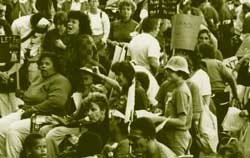Early days in Berkeley, and where we are now
Corbett Joan O'Toole reflects:
As a long-time member of the active Berkeley disability rights movements, I see the past decades a certain way.
I am, as some have phrased it, part of the "old guard." I worked in early disability rights organizations and was part of the San Francisco 504 sit-in. Also, because I am an out lesbian, I have occupied a somewhat different seat on this disability bus than many of my non-queer colleagues. As a white woman with a physical disability, I had access to local disability power structures that included everything from major policy decisions to hot tub parties with national and international leaders.
The more I review primary source materials, the more I appreciate how profoundly radical the early disability rights activists were. Their goals were to change the fabric of society until people with disabilities became equal members. It was not about integrating public schools, but about using the unique experiences of Deaf and disabled students to re-examine and re-define the fundamentals of education. The tasks they envisioned were wholesale reframings of basic assumptions of who belongs in a community, how decisions are made, and what constitutes equality.
The first director of the Berkeley Center for Independent Living was not Ed Roberts, as is commonly misreported, but Larry Biscamp, a white, high-school educated local radical. The founders of CIL wanted to be different from the conservative (in their view) UC Berkeley Disabled Students Program. Their slogan was not "build a ramp and let us in the building" but instead "let's tear the building down and re-make it together."
The San Francisco 504 sit-in did not succeed because of a brilliant strategy by a few disability leaders. It succeeded because the Deaf people set up a communication system from the 4th floor windows inside the building to the plaza down below; because the Black Panther Party brought a hot dinner to all 150 participants every single night; because people from community organizing backgrounds taught us how to make collaborative decisions; because friends came and washed our hair in the janitor's closet sink.
The people doing disability rights work in the 1970s rarely agreed on policies, or even on approaches. The successes came because people viewed each other as invaluable resources working towards a common goal.
I would argue that as the movement got some mild successes nationally, some people became invested in benefiting from, and supporting, more conservative goals. They pushed for a ramp into city hall but not for voting rights for all disabled people. Some independent living centers required college degrees and sometimes social work degrees for staff positions, effectively framing the work as client-counselor as opposed to the initial vision of peers.
A friend reminds me that at every point in the history of any movement, there are reactionaries, radicals, people of all races, religions.
During the 1980s and into the mid-1990s I was very discouraged by the lack of a prominent disability activist vision for social change. I saw many disability organizations become disability institutions. I saw discussions focus on the concerns of highly placed people with disabilities. People without disability institutional power were denied access to the microphone.
In the mid-1990s I saw a resurgence of radicalism in the thinking of young scholars. Unwilling to accept 1980s paradigms of disability work, they looked to their own experiences as openings for intellectual pursuit. To me, many of the most intellectually interesting discussions within disability studies are from younger scholars.
Are the original visions of fully inclusive and accepting communities "outdated"? Has the idea of full educational representation of disability culture and perspectives in education become "outdated"? I don't think so.
Sometimes it takes the elders of a community to remind us where we have been, where we are and what are the consequences of our chosen path. I, for one, welcome their vision as I welcome the challenges and vision of the younger scholars.
Corbett O'Toole, with the UC/Berkeley disability studies program, is a board member of the Society for Disability Studies.

Photo by Tom Olin of a disability rights demonstration during the 1990s.